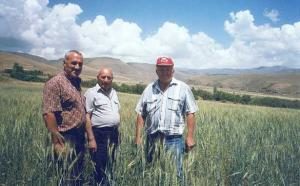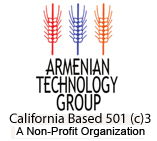Garni -- Wheat Flourishes on Ancient Village Land
| April 29, 2006
For additional photos related to this article  , visit the ATG Photo Gallery. Garni, Province of Kotayk, Armenia — In the backyard patio of their home in Garni, an ancient village on the main road leading to the rock monastery of Geghard, wheat farmer and beekeeper Miasnik Abelyan and his wife talked with friends from Yerevan. In a small fenced area, several llamas grazed. A peacock shrieked: “For the past few years, I have raised llamas and peacocks,” Abelyan said. “I am a farmer, but I have always loved working with animals, especially those not native to Armenia. It is relaxing, and helps us learn about other worlds, and cultures.” In Soviet times, Abelyan’s father directed the kholkhoz, or collective farm, of Garni. “I grew up in a farming family, close to the soil,” Abelyan said. “This shaped my life. I bought a store, which adjoins our house, and which adds to our income. But my life is farming. Working the land is what I love.” After the Soviet collapse, life changed in Garni. It became difficult to obtain good seed, herbicide, and fertilizer. This resulted in poor grape, tree fruit, and grain harvests and, eventually, harmed the fertility of the village’s agricultural land. “We had a hard time for several years,” Abelyan said. “Many farmers stopped planting, and some even left Garni, moving to Russia and elsewhere. It hurt to see so many families leave our village.” A chance meeting with Garnik Petrosyan, head of the Crop Production and Plant Cultivation division of the Armenian Ministry of Agriculture, led Abelyan to the Yerevan office of the California-based Armenian Technology Group (ATG). “I had known and trusted Garnik for years,” Abelyan said. “I knew he would offer good, sound advice. Then, at the ATG office, I was surprised when I met Gagik Mkrtchyan, who was directing ATG’s seed agency, the Seed Producers Support Association (SPSA). I had known Gagik when we were children, when our families visited each other. “From that day, we started working on a program which would help our village wheat farmers and, in the long run, the economy of the entire village. Gagik told me about Dadash, a new variety ATG had brought to Armenia, and which grows well in drought conditions, typical in Garni. Gagik and I went to Sissian, where SPSA farmers have had success growing Dadash. There, I met Sevada Ivanyan and Araik Tangyan, who showed me their Dadash fields. I was impressed with the quality of the seed and how well it grew in rain-fed fields.” New variety takes root in Garni, Vardenis mountains In his backyard, Abelyan showed Mkrtchyan, fellow-SPSA agronomist Vaghinak Kamrastyan, and Roger Culver, ATG’s in-country director until 2000, his wide array of fruit trees and vines, especially two walnut trees and a large, drooping mulberry tree. Across a fence naturally formed by blackberry bushes, a neighbor irrigated several rows of tomato plants. “I love the land, and the water, here in Garni,” Abelyan said. “I can’t picture myself anywhere else. I want to do everything I can to help people stay in the village, for life to be good, like in the past.” Walking past ripening grapes and vegetable plants, the men returned to the table in Abelyan’s patio. After greeting a neighbor, they left to see his plot of Dadash, located just north of Garni. Upon arriving, Abelyan smiled as he entered the field, wheat husks swaying in the hot summer breeze. “The wheat got off to a slow start, due to a wet spring,” Abelyan said. “In May, the plants started growing, so I hurried and applied fertilizer. Now, it looks like a good harvest, especially for these fields, since the soil quality here isn’t good. Before, we were getting only one and a half metric tons per hectare. This year, I expect up to five tons. “For the past two weeks, village farmers have been coming here to see my field of Dadash,” he continued. “Other varieties were doing poorly. Now, with Dadash, farmers here have hope. I plan on cleaning the seed myself and selling it to our farmers. This will be a huge boost for Garni.” Abelyan went on to tell about his cooperation with farmers in Vardenis, in the village of Khachaghbyur. “In Khachaghbyur, four of us farm together, on land which had lain fallow for years. The land has an elevation of over 2,100 meters. We knew Dadash grew well in Sissian, which also has a high elevation. We bought the seed from Sevada, from the same fields we had visited last year. “Thanks to our friends at SPSA, we are starting to have good harvests again, in places where farmers had given up hope. And, last year when the price of wheat fell, they told us to grind the seed and sell it for flour, and recommended a flourmill in Vardenis. We all appreciate what Gagik and Vaghinak are doing for us. “My dream is for everyone in Garni, and in all of Armenia, to have work, to be able to support their families,” Abelyan said. Looking in the direction of Garni’s ancient temple and famous river gorge, he continued: “Every year, we climb to the top of the mountain, to Havouts Tar, an old church now in ruins. There, we remember our ancestors, and what they left behind for us. To the east, at the end of the gorge, I have several beehives near Geghard village. We use the honey ourselves, and give the rest to friends.” Recently, Abelyan met with Mkrtchyan and Kamrastyan in the ATG office in Yerevan. They made plans for the coming year’s harvest, and talked about SPSA’s experimental plots and which varieties are showing promise. “This year looks like an excellent year for Armenia’s wheat farmers,” Abelyan said. “So far, the weather has been on our side. “Our village is over 4,000 years old. Now, we have hope for the future, for our farmers and their families.” For more information about how you can help Armenia’s farmers, contact the ATG office at (559) 224-1000 or by e-mail (info@atgusa.org). Tax-deductible donations can be sent to ATG; 1300 E. Shaw, Suite 149; P.O.Box 5969; Fresno, CA 93755-5969. |

Follow Us